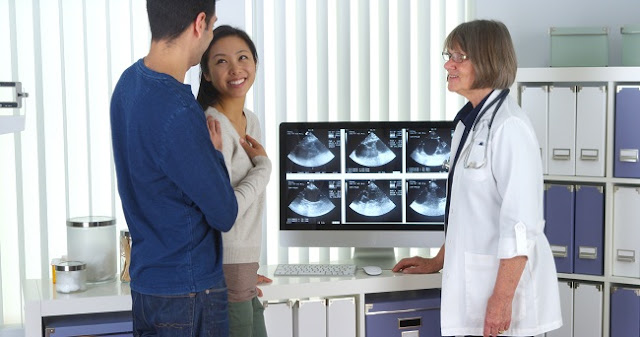1 Month Pregnant, Hormone Changes and Morning Sickness
When you are 1 month pregnant, you do not look like a pregnant person. But may have felt certain symptoms, including late menstruation, nausea, and vomiting, or often referred to as morning sickness.
Fertilization usually occurs around two weeks after the first day of last menstruation, around the time after the body produces eggs. Until reaching 1 month of pregnancy, the fetus is still a collection of cells called embryos, which continue to divide and develop to become small babies in the following months.
How is 1 Month Fetal Growth?
When 1 month or 4 weeks pregnant, the baby still resembles a small dot with a length of about 0.2 cm. The cells in the embryo cluster to then develop into body parts.- Endoderm: the innermost layer that forms into the respiratory and digestive system, such as the lungs, intestines, stomach, and bladder.
- Mesoderm: the middle layer that develops into muscles, bones, heart and blood vessels.
- Ectoderm: the outer layer which then becomes the nervous system, brain, tooth enamel, nails, eyepiece, and skin. This week, the embryo attaches to the yolk sac which supplies nutrients to the fetus. In the next few weeks, this function will then be replaced by the placenta. These placental cells that develop in the uterine wall provide blood flow which ensures that the fetus gets enough nutrition and oxygen.
- At this time women are generally only beginning to realize that they are pregnant because they are late for their period.
- The baby's nervous system and major organs begin to develop.
- A vacuum or neural tube is formed as the development of the ectoderm layer which then becomes the spinal cord and the baby's brain. Abnormalities at the end of the neural tube can lead to spina bifida or neural tube defects. Meanwhile, abnormalities in the neural tube head result in anencephaly or conditions when the cranium is not formed properly.
- The heart and vessels have begun to form. At this time, blood circulation has begun to work. A blood vessel will form, which will then develop into the umbilical cord, to connect the baby's blood circulation with the mother.
- The embryo begins to form a crescent and has a tail so it looks like a tadpole with thin translucent skin.
- A bulge forms at the end of the neural tube which will develop into the head and brain.
- When an ultrasound is performed, the heart can begin to look throbbing.
- Legs and arms will begin to appear.
- There are small hollows on both sides of the head that will develop into the ears. There are also areas with thickened surfaces, which will develop into the eye.
- His heart was beating 150 beats per minute.
- The embryo has grown to 10 mm.
- The brain has developed so rapidly that it makes the head grow faster and is bigger in size
- The embryo appears to have a large forehead with eyes and ears that continue to develop.
- Cartilage begins to form and begins to develop into the bones of the arms and legs.
- Nerve cells begin to multiply and develop into the nervous system.
4 weeks pregnant
Embryos begin to develop in the womb. The outermost cells begin to form tissue to the mother's blood supply. While the inner cells form into two, then three layers, and then develop into the baby's body. These layers are:5 weeks pregnant
6 weeks pregnant
7 weeks pregnant
Changes that Happen During 1 Month of Pregnancy
At 3 weeks gestation, generally many do not realize that they are pregnant because they do not feel any symptoms. However, some women may experience increased vaginal fluid volume, slight cramps, back pain and headaches. When you are 7 weeks pregnant, your uterus has developed to be the size of a lemon. You may feel weak, tired easily, breast enlargement and pain, and more often want to urinate. About 90% of pregnant women experience nausea and vomiting in early pregnancy, known as morning sickness. These symptoms are a sign that the pregnancy hormone in your body is enough to support pregnancy. Women who experience nausea in early pregnancy have a lower risk of miscarriage than those who do not experience nausea. Although it does not mean that women who are not nauseated, cannot get a healthy pregnancy.What should be checked?
You may need to try having a pregnancy check-up with a testpack more than once. Some women need to wait for 2-3 weeks after being late for the month so that pregnancy hormone levels are high enough to be detected. After a positive pregnancy, you and your partner should immediately consult an obstetrician. Some women can feel symptoms of morning sickness more severe than others, so they are unable to perform normal activities. If not handled properly, this condition can cause depression, even interfere with the health of pregnant women and fetuses. Nausea in early pregnancy can also be very severe, or known as hyperemesis gravidarum (HG). This situation is characterized by high frequency of vomiting, not being able to eat and drink and weight loss. HG can also affect the health of babies. Therefore, if nausea is felt to be very disturbing, immediately check with your doctor to get proper treatment.Things to Look For When 1 Month Pregnant
The following are things that can be done and need to be avoided during 1 month of pregnancy:- If morning sickness is not too annoying, continued active exercise can keep the body in shape. Choose the appropriate exercise during pregnancy.
- Remember that your fetus will consume and be affected by everything you consume. Avoid cigarettes, caffeine, illegal drugs, liquor, and certain foods such as raw foods that can be harmful to the fetus.
- Also consult all medicines that are currently or will be taken, both over-the-counter and prescription drugs.
- Lifestyle changes, such as avoiding cigarettes and alcohol, also apply to your partner. Cigarette smoke inhaled by pregnant women can be bad for the fetus.
- Take folic acid supplements for pregnant women, which also contain iron.
- Changes in the womb and physical changes in pregnant women can make the body tired quickly. Make sure you get enough rest every day.



Komentar
Posting Komentar